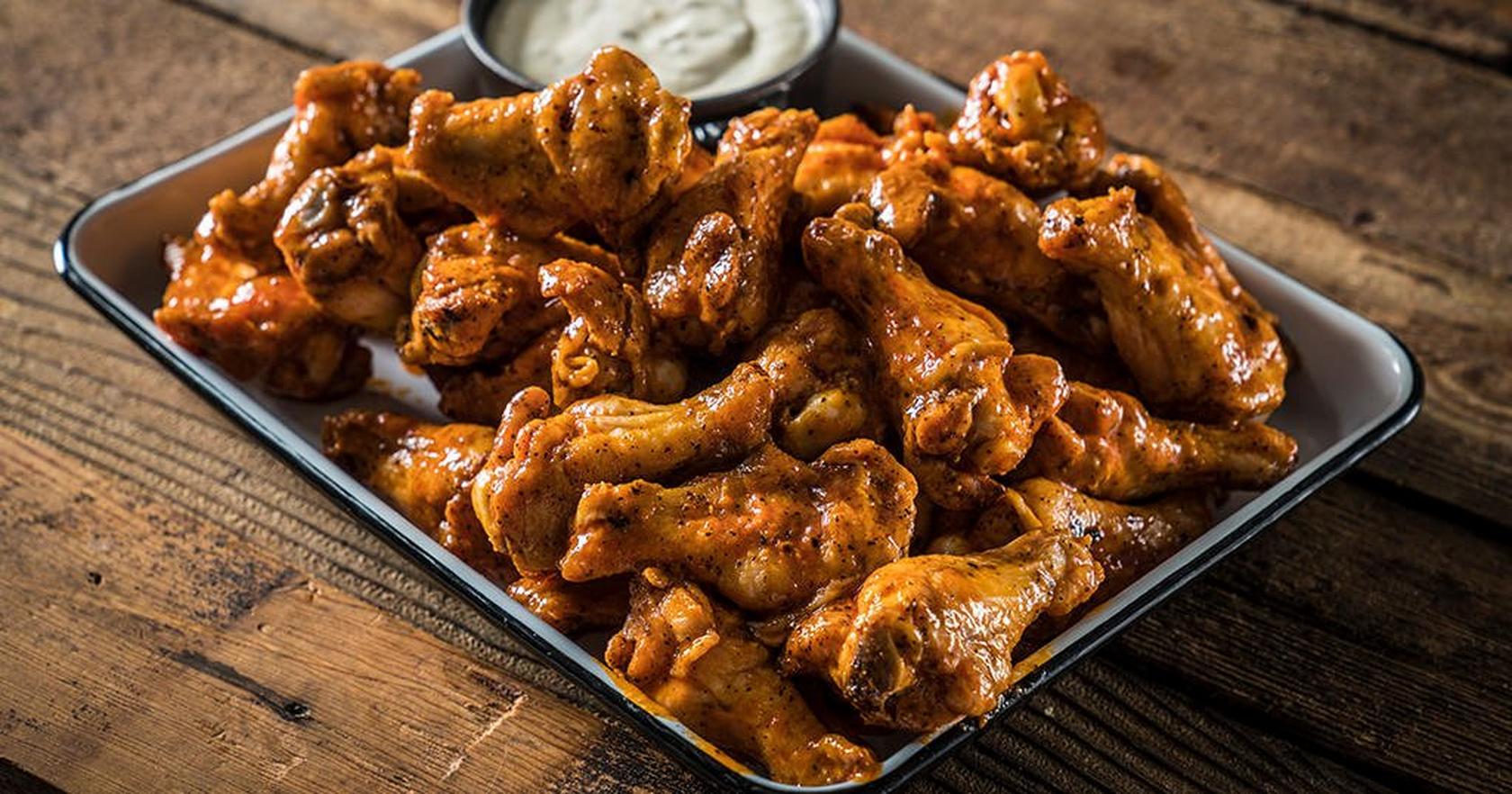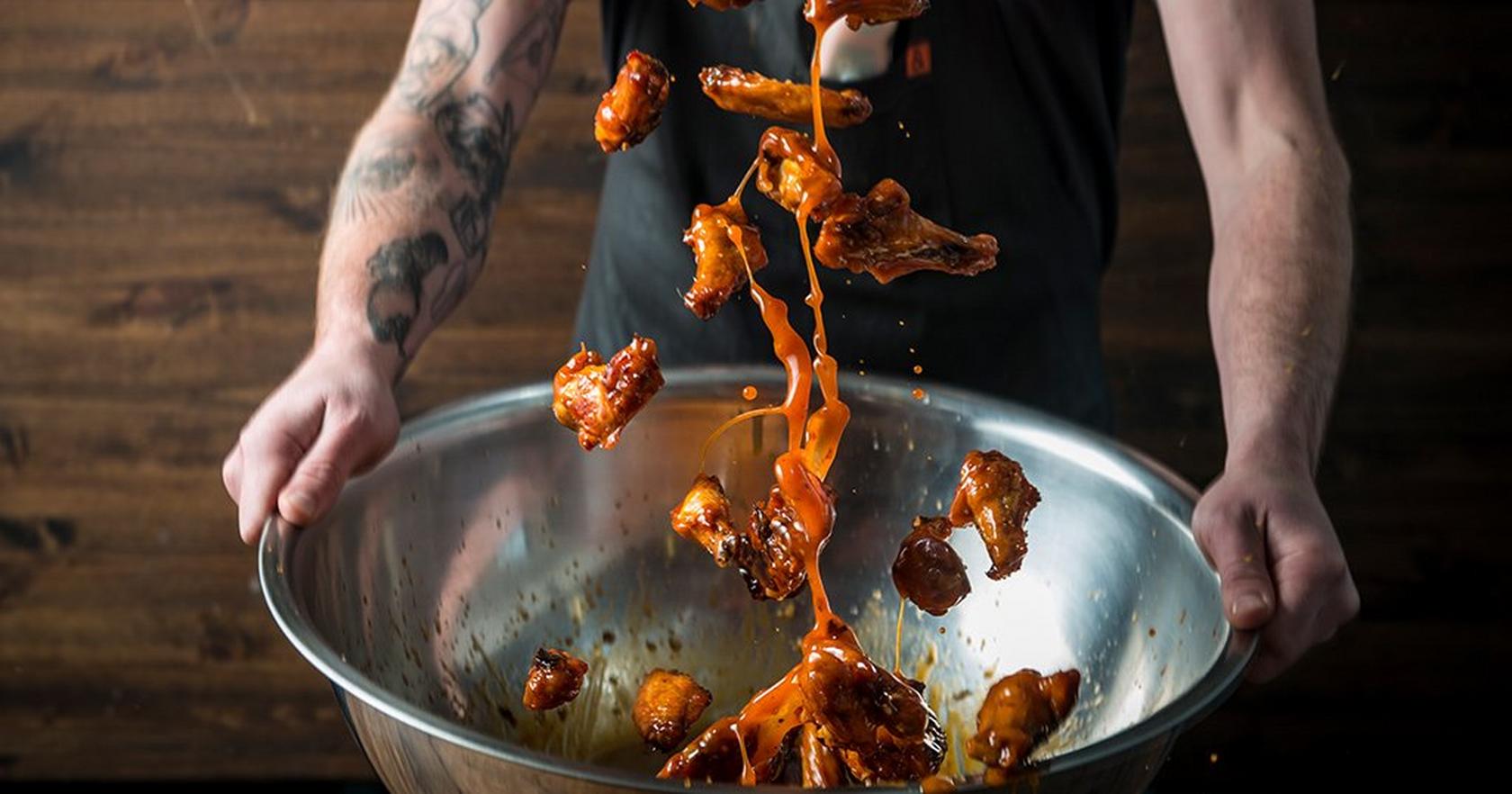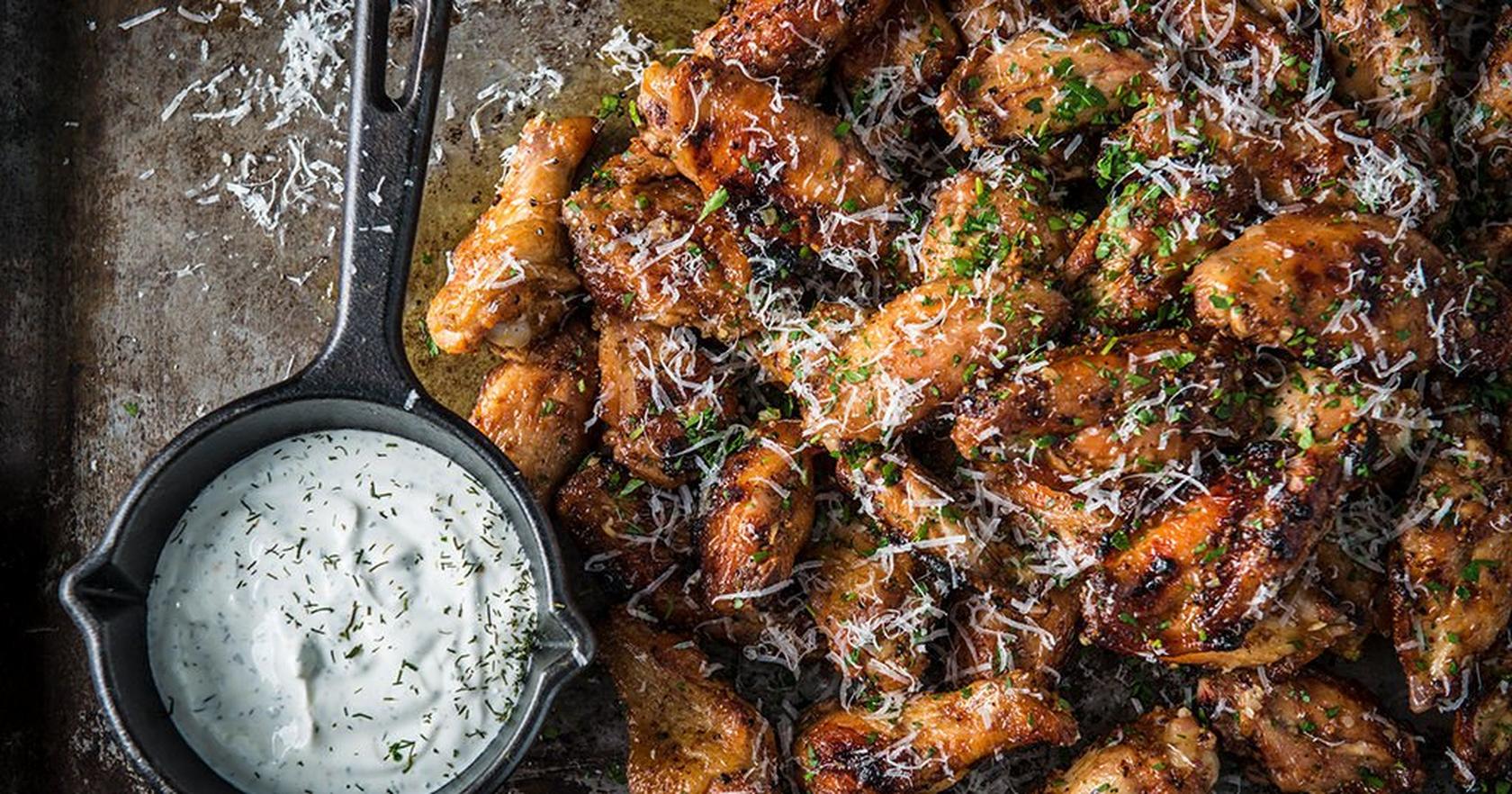
Looking to unlock the secret to extraordinary chicken wings? No deep fryer, charcoal, or gas method rivals the natural smoke flavor from a pellet grill that infuses each wing. Revel in the enticing layers of texture and taste, courtesy of the pellet grill's wood-fired flavor. To achieve grill-master levels of perfection, learn how to make grilled chicken wings on a pellet grill by following our expert guide.
How To Grill Chicken Wings
If you're going to grill chicken wings, it's important to follow your chicken wing recipe. However, if you need a basic how-to, following these steps are a good start:
-
Set your pellet grill to 375 degrees Fahrenheit. Preheat with the lid closed for about 15 minutes.
-
Prepare the wings using your favorite seasoning method (see below).
-
Place on the grill and cook for about 35 minutes, turning the wings halfway through the cooking time. The minimal internal temperature for chicken is 165 degrees, but most people prefer a more cooked-through texture, so aim for 175 to 180 degrees.
-
Toss in sauce or extra rub, and let ‘em rest for about 10 minutes before digging in.
For how to smoke wings, look here: Smoked Chicken Wings Guide.
How to Season Chicken Wings
The three most popular options for seasoning chicken wings are brines, dry rubs, and sauces. You should use at least one of these methods to give your grilled wings the best flavor. You can also use them in combination.
Brine
A brine is a mixture of salt and water. The standard ratio is one cup of salt for every 16 cups of water. Soaking chicken wings in salty water causes the meat to retain more moisture during cooking. You're less likely to end up with dry meat if you brine the wings.
You can also add aromatics such as garlic, bay leaves, and black peppercorns to the chicken wing brine. This will give the meat and skin a hint of additional flavor.
Make enough brine to completely cover the wings, then refrigerate them for up to 24 hours. Soaking for more than 24 hours may cause the meat to take on an unpleasantly mushy texture.
Another brine option is the dry brine. Here, you apply the salt directly to the wings, then let them sit on a rack in the refrigerator overnight with a cookie sheet below to catch any drippings. The salt will melt into the meat while the circulating air dries the surface of the wings.
Brining is optional, you can make perfectly juicy wings without it.
Dry Rub
A dry rub is a mix of spices, seasonings, and aromatics applied to the surface of the wings before cooking. Rubs almost always contain salt to flavor the meat and help it retain moisture during cooking.
Usually, rubs have a spicy or peppery element, whether it's basic ground black pepper, paprika, cayenne pepper, chili powder, or others. The bright color of the ground pepper gives the wings a more appealing presentation. For instance, our Traeger Chicken Rub contains black pepper and chile powder.
Pat the wings dry with a paper towel before applying a dry rub. This step will help the rub stick.
Even if they don't use a dry rub with multiple ingredients, almost all cooks dust wings with salt before cooking.
Sauce
Like a dry rub, a sauce usually includes salty and spicy ingredients. The difference is these ingredients are in liquid form, such as soy sauce (salty) or hot sauce (spicy).
Chicken wings sauce often includes butter or oil which helps the sauce stick to the wings.
The sauce can be used in one of three ways.
1. Brush the sauce on the wings near the end of the grilling process. With this method, the sauce will bake onto the wings as a glaze. This works best with thicker, stickier sauces.
2. Toss the wings in the sauce after they are cooked through. Add cooked wings to a large bowl, pour the sauce over them, toss with tongs, and serve.
3. Serve the sauce on the side for dipping. This is a good method if you have multiple sauces (or picky eaters). Your guests can decide which sauces they want, how much they want, or if they want sauce at all.
If you don't want to make your own chicken wing sauce, consider shopping one of our delicious pre-made BBQ sauces.
How Long To Grill Wings
We recommend grilling chicken wings at 375 degrees Fahrenheit for 35 minutes, turning them halfway through the process. The safe internal temperature for chicken is 165 degrees, but most people like their wings cooked to a higher temperature (175 to 180 degrees). You can use a MEATER wireless meat thermometer to check the temperature of the wings, but because wings don't have a lot of meat, it can be difficult to get a reading. If the meat starts to pull away from the bone, it's a sign the wings are fully cooked.
How to Make Crispy Chicken Wings
Wings taste pretty good no matter how you cook them, but achieving perfectly crisp skin is a sign of grilling mastery.
The original recipe for buffalo wings calls for deep-frying, and this method is perfect for getting crispy skin.
When grilling wings, getting crispy skin is more of a challenge. Here are our top tips for getting crispy chicken wings.
Fully Dry the Wings Before Grilling
When you want crisp wings, moisture is the main enemy. Everything you do will be about reducing the amount of moisture on the skin.
The first method is dry brining. One day before cooking, generously salt the wings, then place them on a rack that's above the surface of a baking sheet. Air from the refrigerator will dry the skin of the wings while the meat absorbs the salt.
If you plan to cook the same day, pat the wings dry with paper towels. This can be a dull and lengthy process as wings have a lot of moisture. But the drier you get them, the crispier the skin will be.
Grill Directly on Grates
Wings can be cooked on a baking sheet or in an oven-safe dish, but then they'll be swimming in their own moisture. Grilling wings directly on the grates (especially the Traeger Woodridge Grills) gives the moisture a place to drip. Also, air flowing freely around all surfaces of the wings will help dry the skin.
Add a Light Coating of Cornstarch or Baking Powder
Many cooks have experimented with adding cornstarch or baking powder to their dry rub as a method of getting crispier wings.
Cornstarch is used to give a crispy coating to fried chicken, and it works with wings as well. Baking powder -- which has cornstarch in it -- adds the extra component of a chemical reaction that creates small bubbles within the coating that crisp during cooking. There is no clear consensus, so it may be worth trying both methods and seeing what you prefer.
Use a teaspoon of cornstarch or baking powder per pound of wings.
“You definitely want to apply a warm sauce to the meat. You can also add a little butter to any sauce and once it is heated it will make it thinner and give it a nice sheen. - Chad Ward”
How to Keep Chicken Wings Moist
While you want crispy, delicious skin on the outside of your chicken wings, you want to make sure it doesn't dry out on the inside. To simultaneously keep your chicken moist while cooking your chicken wings on pellet grill, follow these tips:
- Two-Zone Cooking: Grill the wings over indirect heat so they cook through without drying out, and then sear them over direct hot heat so they're delightfully crispy.
- Monitor Temperature: Monitor the temperature of the chicken wings so that they aren't overdone or undercooked. The safe internal temperature for chicken is 165° degrees.
- Cover During Cooking: To retain moisture in your chicken wings cover the wings during parts of the cooking process to strap steam. You can either use the grill lid or aluminum foil.
- Resting Period: Allow the wings to rest for a few minutes after cooking. This allows the juices to redistribute throughout the meat, keeping it moist.
Best Pellets to Grill Chicken Wings
Since chicken wings are usually paired with strongly flavored, spicy sauces, we recommend using strong-flavored woods like mesquite and hickory. But the ideal match is our Signature Blend of pellets. The strong-flavored blend is designed to match the powerful flavor of heavier meats like game or brisket, but stands up to chicken wing sauce, too.
Chicken Wings Recipes
Here are some popular ideas to get started:

Buffalo wings actually have nothing to do with the animal; they’re named after their birth city, Buffalo, New York. To make your own Buffalo sauce, all you need is hot sauce, butter, and mustard (optional). Simply whisk the ingredients together over your grill or stove until warm and well mixed. For extra heat, add red pepper flakes or chili powder.

If you have a bit of a sweet tooth, consider these wood-fired wings seasoned with our Pork & Poultry rub and then doused in a delicious spicy honey garlic sauce.
Rather than tossing your wings in the sauce, give them a good brush when they’re warm and reserve the rest of the sauce for dipping.

For Parmesan Garlic wings, simply melt butter and parmesan cheese, then stir in dried herbs like oregano, basil, and a generous amount of powdered, minced, or finely chopped garlic. (Or keep it simple by using Traeger Chicken Rub). You can also use olive oil in addition to or instead of butter. Add a pinch of salt and pepper, and a dash of red pepper flakes to turn up the heat.
Best Sides for Chicken Wings
You can't serve grilled chicken wings on a pellet grill without delicious sides. While traditional celery and carrot sticks are always a good choice, why not make some delicious wood-fired appetizers?
Smoked Hummus with Roasted Vegetables: Not only will this hummus act as a cooling element to spicy wings, but it can also be a flavorful dipping option for your veggies or chicken wings.
Fries and Homemade Ketchup: Pair finger food with finger food by making crispy, thick-cut fries and spicy chipotle ketchup.
Smoked Mac & Triple Cheese: Cream cheese, gouda, and cheddar will come together for a rich and cheesy taste to balance out spicy, tangy chicken wings.
Now that you know how to best make chicken wings on a pellet grill for your next game day, fire up your Traeger and get ready to go.
Grilled Chicken Wings Three Ways
by Traeger Kitchen
3 Reviews
Prep Time
15 Min
Cook Time
45 Min
Serves
8
Pellets
Cherry
Making a variety of sauces (each assembled in just a couple minutes) to toss cooked wings into is a super easy way to offer a choice of flavorings. Here we have a fruity and fragrant BBQ sauce, a take on bang bang sauce, and a tandoori spiced sauce. Save yourself a step and buy what are known as chicken party wings—wings sold already broken down into flats (also called wingettes) and drumettes (which look like tiny chicken legs). You can also butcher whole wings yourself; just discard the wing tip or save it for the soup pot.
Ingredients
Bang Bang Sauce
| 1/4 Cup | mayonnaise |
| 1 Teaspoon | Traeger Anything Rub |
| 1 Tablespoon | sriracha sauce |
| 2 Tablespoon | sweet chili sauce |
BBQ Sauce
| 1/4 Cup | Traeger Apricot BBQ Sauce |
| 1 Tablespoon | soy sauce |
| 1 Tablespoon | sriracha sauce |
| 1 Teaspoon | five-spice powder |
Tandoori Spiced Sauce
| 2 Teaspoon | tandoori spice |
| 2 Tablespoon | honey |
| 1 Tablespoon | fresh lemon juice |
| 2 Tablespoon | canola oil or other neutral oil |
wings
| 8 Pound | chicken party wings |
| 1/3 Cup | Traeger Anything Rub |
Serving
| Scallion, sliced | |
| Sesame seeds | |
| Dipping sauces, such as ranch or blue cheese (optional) |
1
Make the bang bang sauce: In a medium bowl, whisk the ingredients together.
2
Make the BBQ sauce: In a medium bowl, whisk the ingredients together.
3
Make the tandoori sauce: In a medium bowl, whisk the tandoori spice, honey, and lemon juice. Heat the oil until hot, then pour it over the mixture to bloom the spices and stir to combine.
4
Cook the wings: Heat the Traeger with the lid closed to 375°F; this will take about 15 minutes.
5
Meanwhile, in a large bowl, toss the wings with the Traeger Anything Rub.
6
Place the wings directly on the grill grates. (To fit them all, you will need to use multiple grates at different levels or cook them in batches, depending on your grill model and the size of your grill.) Cook, flipping once about halfway through, until the skin is crisp, and the wings are cooked through (170°F to 175°F on an instant read thermometer), 35 to 45 minutes total.
7
Divide the cooked and crispy thighs among the three different reserved sauces and toss to coat well. Top the tandoori wings with scallion and the BBQ wings with sesame seeds and serve all three with your favorite dipping sauces as desired. Enjoy